
- Terms and Conditions
- Privacy Policy

State of Qatar
- Key Facts and Information
- Political System
- Qatar National Vision 2030
- General Information
- National Anthem
- National Flag
Education in Qatar
- Tourism in Qatar
- Investment in Qatar
- THE AMIR OF THE STATE
- The System of Government
- Constitution
The State of Qatar attaches great importance to human development. Thanks are due to its wise leadership which always emphasizes the importance of the human element as the main source of development.
Formal education was established in the State of Qatar in 1952, and the pace of educational development in the state accelerated until it included every population gathering for both sexes and at all stages up to university education.
The state has established many schools, universities, colleges, and research and training centers that have contributed to developing the skills of human cadres, and have attracted many international schools and universities.
The State of Qatar also encourages the establishment of private educational institutions of all kinds and provides them with continuous support in the legal and supervisory aspects.
In 2004, Qatar launched an initiative to develop public education in the state under the slogan "Education for a New Era", which aimed at providing the best means of education for children. The Ministry of Education and Higher Education is responsible for drawing up the educational policy in the state, developing the educational plan and supervising its implementation to achieve Qatar Vision 2030 in building a Qatari individual capable of effective participation in all aspects of life.
Education Sector Achievements
The general framework of the national education curriculum for the State of Qatar has been completed, and a project has been launched to develop and raise the efficiency of primary school students in reading, writing and mathematics. In addition, it aimed at expanding the application of e-learning, developing the examination system, modernizing the adult education system and establishing evening education centers.
A secondary school for banking sciences and business administration for girls, a specialized school for students with autism disorder and mild-moderate intellectual disability, and a secondary school for science and technology for boys applying STEM programs were opened in September 2018.
Public Education
In 2017, the State of Qatar ranked first in the Arab world and ninth in the world in the Basic Education Quality Index, which consists of primary (six years), preparatory (three years), and secondary (three years) education, with a unique educational system.
A parallel track for adult education at the secondary level was developed, and an evening center was opened at the Qatar Technical Secondary School for Boys. Procedures for the executive plan for the project to establish a technical secondary city for girls were developed and implemented.
Private Education
Private education constitutes a large percentage of the education sector in terms of the number of students and schools in Qatar. The state attaches great importance to private education and supports it by providing educational guidance, health care, and water and electricity fees exemption.
The State is trying to attract and encourage the private sector to open international schools, provide lands for them, and establish schools for limited-income migrant students, in addition to establishing a technical school in the private sector for students with disabilities.
Higher Education
The state is interested in providing opportunities for higher education and scientific research in all fields and disciplines to raise educational efficiency and quality of outputs, as it is the source for graduates qualified to work in development activities in society, and an area for research and studies of interest to society. The number of higher education institutions has reached (30) universities and colleges, which offer (168) programs for undergraduate studies and (131) postgraduate master's and doctoral programs.
The scholarship system has been updated; the number of students on scholarships inside and outside the state has increased. The educational certificates equivalency system has been established, and a department for public and private higher education institutions has been established and licensed. In addition, the cultural attaché in the United States was opened.
For more information about higher education please visit: www.edu.gov.qa
Qatar University

Qatar University is the only national educational institution, which was founded in 1973 and officially turned into an integrated university in 1977. The university currently includes ten colleges: College of Arts and Sciences, College of Administration and Economics, College of Education, College of Engineering, College of Law, College of Health Sciences, College of Pharmacy, College of Medicine, College of Dentistry, College of Sharia and Islamic Studies. There are currently (52) postgraduate programs at Qatar University that are designed in response to the national needs of the State of Qatar.
For more information, please visit: www.qu.edu.qa
Qatar foundation.
Qatar Foundation for Education, Science and Community Development in Doha, which was opened in 1996, leads the efforts to achieve leadership in human, social and economic development in the State of Qatar. This is achieved through education and research, making it at the forefront of constructive change in the region, hence becoming an example in the international community.
For more information, please visit: www.qf.org.qa
How Qatar’s Education Above All grew into a notable advocate globally

Qatar participates in European Conference on International Education in France
Education GPS --> The world of education at your fingertips
- Netherlands
- New Zealand
- Slovak Republic
- Switzerland
- United Kingdom
- United States
- OECD average
- TALIS average
- Bosnia and Herzegovina
- Brunei Darussalam
- Chinese Taipei
- Dominican Republic
- El Salvador
- Kyrgyz Republic
- North Macedonia
- Palestinian Authority
- Philippines
- Saudi Arabia
- South Africa
- United Arab Emirates
- PISA 2022 Results (Volume I): The State of Learning and Equity in Education
- PISA 2022 Results (Volume II): Learning During - and From - Disruption
- PISA 2022 Results (Volume III): Creative Minds, Creative Schools
- PISA 2018 Results (Volume IV): Are Students Smart About Money?
- PISA 2018 Results (Volume VI): Are Students Ready to Thrive in an Interconnected World?
- PISA 2018: Are Students Ready To Take On Environmental Challenges?

- Survey of Adult Skills (PIAAC)
- TALIS 2018: Highlight indicators
- TALIS 2018 (Volume I): Teachers and School Leaders as Lifelong Learners
- TALIS 2018 (Volume II): Teachers and School Leaders as Valued Professionals
- TALIS 2018 (results for primary and upper secondary)
- TALIS 2018: Starting Strong Survey
- Low performers
- Computers, education & skills
- Collaborative Problem Solving
- Access & participation
- Student mobility
- Education attainment
- Education system & governance
- Financing education
- Learning environment
- Students' well-being
- Digital divide
- Special needs
- Socio-economic status
- Migrant background
- Economic & social outcomes
- Teachers & educators
- Education leadership
- Evaluation & quality assurance
- Future of education and skills
- Research & innovation
- Early childhood education & care
- Vocational education & training (VET)
- Tertiary education
- Impact of COVID-19 in education

- Future of education & skills
- Research & innovation in education
>> Programme for International Student Assessment (PISA) 2022 Results: Qatar - Country Note
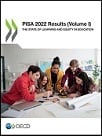
The OECD Programme for International Student Assessment (PISA) examines what students know in reading, mathematics and science, and what they can do with what they know. It provides the most comprehensive and rigorous international assessment of student learning outcomes to date. Results from PISA indicate the quality and equity of learning outcomes attained around the world, and allow educators and policy makers to learn from the policies and practices applied in other countries. This country note provides a country-specific overview of Qatar.
| Publication date: | 05 December 2023 |
| ✓ Read the publication: |
| ✓ Further information: |
| ✓ Comparative report: |
| ✓ See also: |
| ✓ |
Explore further
Commission a country report
Licence or Product Purchase Required
You have reached the limit of premium articles you can view for free.
Already have an account? Login here
Get expert, on-the-ground insights into the latest business and economic trends in more than 30 high-growth global markets. Produced by a dedicated team of in-country analysts, our research provides the in-depth business intelligence you need to evaluate, enter and excel in these exciting markets.
View licence options
Suitable for
- Executives and entrepreneurs
- Bankers and hedge fund managers
- Journalists and communications professionals
- Consultants and advisors of all kinds
- Academics and students
- Government and policy-research delegations
- Diplomats and expatriates
This article also features in The Report: Qatar 2022 . Read more about this report and view purchase options in our online store.

How Qatar’s education sector is equipping students for the future
Qatar | Education
Decades of concerted investment in education have helped Qatar create a qualified workforce equipped with the skills needed to succeed in growing professions. The country’s literacy rate in 2019 was 99.2% of individuals 15 years old and above, while the gross enrolment rates for primary, preparatory and secondary education are all around 100% – a reflection of the mission to provide education for all.
Education, research and training are key components of Qatar National Vision 2030, the country’s long-term framework to build a knowledge-based, sustainable and diversified economy. To do so, one goal of the vision is to increase the number of educational facilities from 354 schools in 2012/13 to 482 in 2018/19 and 524 in 2023/24. In line with the growth set out under the roadmap, the contribution of the education sector to GDP increased from 1.3% in 2012/13 to 3.3% in 2018/19.
Qatar has worked to position itself as a regional and global leader in education. In December 2021 Doha hosted the 10th World Innovation Summit for Education, an annual event that brings together leaders in education, technology and economic development. Organised by Qatar Foundation (QF), the summit featured more than 300 speakers and aimed to address global challenges in the education sphere, including the loss of access to education for marginalised youth as a result of Covid-19-related lockdowns.
Qatar’s formal education system was established by the Education Law of 1954, and in 1973 an Amiri decree was issued to create the first tertiary institution, the College of Education. The founding of Qatar University followed in 1977 with four colleges: education, humanities and social sciences, Islamic studies and science, and sharia and law.
A series of reforms in the early 2000s modernised the K-12 segment in terms of structure and teaching practices. Education shifted from the traditional rote learning, teacher-centred system into one that emphasised critical thinking, inquiry and discovery. Standards for student performance and school curricula were implemented at this time. For the latter, curricula reform focused on Arabic, English, science and mathematics, as well as the management structure of schools. The Supreme Education Council (SEC) was created in November 2002, which developed and implemented the sector reforms.
In 2016 the SEC merged with the Ministry of Education to become the Ministry of Education and Higher Education (MEHE), which is the government entity responsible for developing and regulating the sector. It has oversight authority for both public and private K-12 schools, as well as higher education institutions. It also licenses private schools; provides scholarships to Qatari students; recruits, trains and licenses public school teachers; and sets curricula standards. The MEHE is headed by Buthaina bint Ali Al Jabr Al Nuaimi, who was appointed in October 2021.
The MEHE is tasked with implementing the Education and Training Sector Strategy (ETSS) 2018-22, which uses an outcome-based rather than project-based approach to implementation. It comprises five pillars: enrolment, achievement and implementation, manpower, citizenship and values, and institutional development and governance. It outlines key performance indicators for each pillar and academic level, including creating a centralised database for education and training; developing more e-services provided by the MEHE; increasing the number of early childhood teachers with recognised qualifications; improving performance in third-, sixth- and ninth-grade exams to 70% or higher; and boosting the number of students who pursue science, technology, engineering and mathematics (STEM). The strategy also aims to expand the role of the private sector in the provision of education.
QF plays an active role in the education system as well. The non-profit organisation was created in 1995 with a donation from former Amir Sheikh Hamad bin Khalifa Al Thani and Sheikha Moza bint Nasser. It is composed of 50 organisations, and aims to leverage its ecosystem to enable people to solve current and future challenges. QF’s flagship initiative is Education City, a 12-sq-km campus in Al Rayyan that hosts local and international universities. These include Hamad bin Khalifa University, Texas A&M University at Qatar (TAMU-Q), Weill Cornell Medicine-Qatar and Northwestern University in Qatar, as well as HEC Paris in Qatar, Georgetown University in Qatar, Carnegie Mellon University in Qatar and Virginia Commonwealth University School of the Arts in Qatar.
Education is free for all Qatari nationals from preschool to university, and public schools are generally reserved for citizens. Growing expatriate populations in Doha, Al Wakrah and Al Rayyan in recent decades have led to a rise in demand for education in those municipalities. This coincided with an expanding pool of private schools, many of which provide foreign language courses and diverse curricula – the International Baccalaureate, US, UK, Indian, Canadian, French and Pakistani are among the most popular. The entry of renowned foreign institutions has bolstered the quality of education, and helped to align teaching practices and curricula in both public and private schools with international standards.
Education in Qatar is divided into five levels: pre-primary for children up to the age of five; primary for grades one to six; preparatory for grades seven to nine; secondary for grades 10 to 12; and higher education. Education is compulsory at the primary and preparatory levels, ensuring children receive at least nine years of schooling, although many students pursue secondary schooling and higher education.
There are four categories of schools: government schools, which follow the nationally designed curriculum; international schools, which apply curricula like the International Baccalaureate; community schools that follow the curricula of institutions in an expatriate community’s home country; and private Arabic schools, which fall partially under the purview of the MEHE. There are also child development centres tailored for students with special needs that offer speech language and occupational therapy. These are open to both nationals and expatriates.
At the beginning of the 2021/22 academic year there were 32 higher education institutions in Qatar: 10 public schools, nine private schools, eight QF-affiliated schools and five military institutions. In addition, Qatar hosts 33 research centres focusing on the environment and energy, health, entrepreneurship, social and humanitarian issues, and innovation.
Public Education
There were 124,628 students enrolled in government K-12 schools in the 2019/20 academic year, up 15.4% from 107,986 in 2015/16, according to the most recent statistics issued by the Planning and Statistics Authority (PSA). Of those enrolled in 2019/20, 64,857 were female and 59,771 were male. Primary school students comprised the largest cohort, at 58,162, followed by preparatory students (29,120) secondary students (28,602) and pre-primary students (8744).
Public universities, meanwhile, hosted 27,777 students in 2019/20, up 26.7% from 21,917 in 2015/16. Females far outnumbered males at government universities, with 21,201 females in attendance (76% of the total) compared to 6576 males (24%) in 2019/20. The large number of females pursuing higher education is having positive effects on wider society. “Thanks to Qatar’s advanced education system, society is becoming more open and sophisticated. Education is playing a vital role in addressing the gender gap and creating a more inclusive labour market,” Clyde Wilcox, interim dean of Georgetown University in Qatar, told OBG.
The top-five academic tracks in 2019/20 were arts and sciences (7346 students), community college (5044 students), administration and economics (4655 students), engineering (3230 students) and education (2395 students). Qataris accounted for 71.2% of the student body, while the next-largest nationality represented was Egyptian, at 4.5%.
Private Schooling
Although there were there more students enrolled in private K-12 schools than public ones in 2019/20, according to the PSA report, the rate at which enrolment at private institutions grew was nearly equal to that in the public sphere.
There were 208,030 students in private K-12 schools in the 2019/20 school year, a 15.2% increase from 180,648 in 2015/16. Of those attending private schools in 2019/20, 97,610 were female and 110,420 were male. As in the public segment, primary schools accounted for the largest share of total enrollees, at 103,726. However, pre-primary was the second-largest level in the private segment, with 46,939 students, followed by preparatory (33,658 students) and secondary (23,707 students).
Private universities, for their part, taught 9335 students in 2019/20, up 28.3% from 6751 in 2015/16. The gender ratio at private universities was more even than at public institutions, with 5068 females and 4267 males in attendance in 2019/20.
In the 2019/20 school year there were 28,154 teachers employed in Qatar’s K-12 education system, instructing a student body of 332,658, according to the PSA. Teachers were split fairly evenly between government and private schools, at 14,622 and 13,532, respectively. The largest share – or 13,131 of teachers – worked at the primary level, followed by the secondary (5644), preparatory (5004) and pre-primary (4375) levels.
Teachers are largely foreign and female: 85.9%, or 24,190, that year were non-Qatari, while around 72.2%, or 20,321, were female. The government also employed 11,027 administrators, while the private sector employed 5998. Public K-12 schools had a lower student-to-teacher ratio, at around 8.5:1, while the rate stood at 15.4:1 among private K-12 schools.
The number of teachers in private schools rose by around 20% from 11,201 in the 2015/16 academic year to 13,532 in 2019/20. Most teachers were employed in primary schools in 2019/20 (6123), followed by pre-primary (3426), secondary (3020) and preparatory (1863). Of the 19,530 individuals employed by private schools across teaching and administrative positions, 14,777 (75.7%) were female and nearly all (19,415, 99.4%) were foreign nationals.
Public colleges and universities, meanwhile, employed 1468 individuals in the 2019/20 school year, 1140 of whom were non-Qatari and 328 of whom were citizens. Around half, or 794 individuals, were employed as professors, while 374 were lecturers, 290 were teaching assistants and 10 were top-level administrative personnel. Qataris accounted for the largest proportion of teachers at public colleges and universities, at 21.81%, or 318 individuals, followed by Egyptians (9.26%, 135 teachers), Jordanians (9.12%, 133 teachers), US citizens (9.05%, 132 teachers) and Canadians (6.99%, 102 teachers).
Private colleges and universities, for their part, employed 2050 teachers and administrative staff that same year. Of this total, 1116 were administrative staff, 505 were professors, 392 were lecturers and 37 were teaching assistants. Non-Qataris numbered 1909, while 141 were nationals.
Education is regarded as key to realising Qatar National Vision 2030 goals, and the proportion of government spending on the sector has stayed at around 9-10% since the roadmap was published. Indeed, education received 10% of the annual budget in 2016, when it was allocated QR20.4bn ($5.6bn). The next year QR20.6bn ($5.65bn), or 10.4% of the total, was earmarked for education, but in 2018 and 2019 the figure fell to QR19bn ($5.2bn) and QR19.2bn ($5.3bn), or 9.4% and 9.2%, respectively. The authorities increased spending on the sector to QR22.1bn ($6.1bn), or 10.5% of the total budget, in 2020, but spending fell again in 2021 to QR17.4bn ($4.8bn), or 8.9% of the budget. The 2021 amount included financing for the expansion and development of existing schools, as well as investment in e-learning programmes made necessary by the pandemic.
In December 2021 the Ministry of Finance released the budget for the 2022 fiscal year, based on an average oil price of $55 per barrel. The QR204.3bn ($56.1bn) budget projected government revenue of QR196bn ($53.8bn) – a 22.4% increase from 2021 – and a deficit of QR8.3bn ($2.3bn). Education was allocated QR17.8bn ($4.9bn), or 8.7% of the total. Qatar has also committed to establishing 45 schools across six packages under the Qatar Schools Public-Private Partnership Development Programme. The programme began in 2019 and is set to run through 2023, with schools established under a design-build-finance-operate-maintain-transfer model.
Qatari authorities have prioritised improving students’ performance on international tests as a way to ensure that children are receiving a quality education. Students in Qatar take both the Trends in International Mathematics and Science Study (TIMSS) test and the Programme for International Student Assessment. The National Development Strategy (NDS) 2018-22 is the second five-year plan launched to support Qatar National Vision 2030, and it places an emphasis on improving Qatar’s TIMSS ranking. In 2015 – the benchmark year for the NDS 2018-22 – Qatari students ranked lower than anticipated. While the international average score at each level was 500 that year, fourth graders in Qatar averaged 439 in maths and 436 in science, while eighth graders averaged 437 in maths and 457 in science.
After the publication of the 2015 scores, the MEHE issued a plan to improve performance by focusing on three factors: academics, awareness and motivation. Each category had several goals, including enhancing student performance by aligning classroom activities with international testing targets; raising awareness about the importance of the assessments; and honouring high-performing schools and students on Education Excellence Day. These efforts are steadily paying off: on the most recent TIMSS exam, conducted in 2019, Qatari fourth graders averaged 449 in both maths and science, while eighth graders averaged 443 in maths and 475 in science.
Scientific Specialisations
Increasing the number of students who pursue STEM disciplines is another of the MEHE’s priorities for meeting the goals of Qatar National Vision 2030. These efforts target students in both K-12 and higher education programmes. In July 2021 the MEHE announced an initiative aimed at boosting enrolment in science and technology among eighth- and ninth-grade students. The pilot programme covers 6000 male and female students across 10 schools, and includes a guidance framework that prepares students to join STEM programmes later in their academic careers.
Higher education administrators, meanwhile, are focusing on STEM as a critical element to creating a knowledge-based society with a workforce equipped with skills tailored for such an economy. Many universities are focusing on not only attracting students to STEM-related specialisations, but also integrating STEM material into other academic programmes – a trend mirrored around the world. Indeed, administrators have found that Qatari youth have shown a strong interest in STEM education. The goal moving forwards will be to encourage these young individuals to continue their careers in STEM-related fields.
Technical Training
In addition to STEM, officials are turning to technical and vocational education and training (TVET) as part of efforts to equip graduates with the skills needed for the job market. TVET programmes offer advanced technological training tailored to the local market, and graduates from Qatar’s TVET institutions receive both a specialised secondary diploma and an internationally recognised certificate issued by Australia’s Chisholm Institute.
In October 2021 the MEHE and the Chisholm Institute signed a partnership agreement under which the Australian organisation would implement a series of accredited technical programmes across Qatar. In particular, it will provide specialised Qatari schools with study materials, training and assessment strategy documents, guides for teachers and students, unit plans and performance-evaluation tools. “In view of technical education’s contribution to refining skills and meeting the needs of an ever-changing world, and in light of the rapid growth of the Qatari economy and industrial sector, technical education has been significantly expanded in the country,” Fawziya Al Khater, assistant undersecretary for educational affairs at the MEHE, told local press in August 2021. She underscored the role such institutions play in developing a knowledge-based economy by providing professionally oriented education.
Qatar is home to two government technical schools, one for male students and one for female students. The Qatar Technical School for Girls opened for the 2020/21 academic year to provide training to women in all sectors of the economy, as well as to further Qatarisation. Such advancements are expanding student choices and aligning learning outcomes with workplace needs. “Education systems that combine equity with quality give the best outcomes for students. They secure an opportunity for every individual to gain the education and skills they need to grow and develop their communities,” Salem Al Naemi, president of University of Doha for Science and Technology, told OBG.
A productive education ecosystem comprising a variety of curricula at public and private institutions is now firmly established in the country, backed by strong public funding and an emphasis on technology that saw the sector through the Covid-19 pandemic (see analysis). The long-term focus on STEM education and TVET – especially the opportunities given to female students in these areas – is positioning Qatari graduates as competitive assets in the labour market. Boosting scores on international tests will also solidify Qatar’s reputation for K-12 learning.
Request Reuse or Reprint of Article
Read More from OBG
Qatar: Economic Snapshot 2024 Click here to read our Qatar Economic Report and Investment Analysis 2024 online …

In Education
Nurturing talent: Amir Berbic, Dean, Virginia Commonwealth University School of the Arts in Qatar (VCU arts Qatar), on professional opportunities for academic staff and the development of students’ skills Interview: Amir Berbic To what extent does the integration of foreign universities in the higher education segment contribute to the development of students’ skills? AMIR BERBIC: Investing in the higher education segment is fundamental for capacity building and societal development. Higher education institutions play a crucial role in nurturing the next generation, equipping them to lead the country forwards by advancing various industries. For example, by teaching disciplines like desi…

Informe: Corredor Interoceánico de México como alternativa al Canal de Panamá In English El Corredor Interoceánico de México y el complejo industrial de Texistepec están emergiendo como un nodo de desarrollo clave que conecta el Océano Pacífico y el Océano Atlántico, y como un centro para el transporte y el comercio internacional. El corredor, que abarca 300 km y une dos de los principales puertos del país, ofrece importantes oportunidades para el desarrollo económico en las regiones menos desarrolladas del sur y sureste de México. Este informe, e…

Register for free Economic News Updates on Qatar
“high-level discussions are under way to identify how we can restructure funding for health care services”, related content.
Featured Sectors in Qatar
- Qatar Agriculture
- Qatar Banking
- Qatar Construction
- Qatar Cybersecurity
- Qatar Digital Economy
- Qatar Economy
- Qatar Education
- Qatar Energy
- Qatar Environment
- Qatar Financial Services
- Qatar Health
- Qatar Industry
- Qatar Insurance
- Qatar Legal Framework
- Qatar Logistics
- Qatar Media & Advertising
- Qatar Real Estate
- Qatar Retail
- Qatar Safety and Security
- Qatar Saftey and ecurity
- Qatar Tourism
- Qatar Transport
Featured Countries in Education
Popular Sectors in Qatar
Popular Countries in Education
- Djibouti Education
- Nigeria Education
- Brunei Darussalam Education
- The Philippines Education
- UAE: Abu Dhabi Education
Featured Reports in Qatar
Recent Reports in Qatar
- The Report: Qatar 2024
- The Report: Qatar 2022
- The Report: Qatar 2020
- The Report: Qatar 2019
- The Report: Qatar 2017
Privacy Overview
| Cookie | Duration | Description |
|---|---|---|
| cookielawinfo-checkbox-analytics | 11 months | This cookie is set by GDPR Cookie Consent plugin. The cookie is used to store the user consent for the cookies in the category "Analytics". |
| cookielawinfo-checkbox-functional | 11 months | The cookie is set by GDPR cookie consent to record the user consent for the cookies in the category "Functional". |
| cookielawinfo-checkbox-necessary | 11 months | This cookie is set by GDPR Cookie Consent plugin. The cookies is used to store the user consent for the cookies in the category "Necessary". |
| cookielawinfo-checkbox-others | 11 months | This cookie is set by GDPR Cookie Consent plugin. The cookie is used to store the user consent for the cookies in the category "Other. |
| cookielawinfo-checkbox-performance | 11 months | This cookie is set by GDPR Cookie Consent plugin. The cookie is used to store the user consent for the cookies in the category "Performance". |
| viewed_cookie_policy | 11 months | The cookie is set by the GDPR Cookie Consent plugin and is used to store whether or not user has consented to the use of cookies. It does not store any personal data. |
Explore QF Your Way
We know this can be a complex organization to navigate. that’s why we've put together tailored journeys based on your needs., ask botaina.
Looking for quick answers about QF and our programs? Let’s Chat
- Media center
- Education City
- Accessibility accessibility_icon
- 01 . Introduction
- 02 . Take a virtual tour
- 03 . Universities and Schools
- 04 . Spaces
- 05 . Events
Education City in Qatar
What started with a single school has transformed into ‘Education City,’ a 12 square kilometer campus housing multiple educational and research institutes.
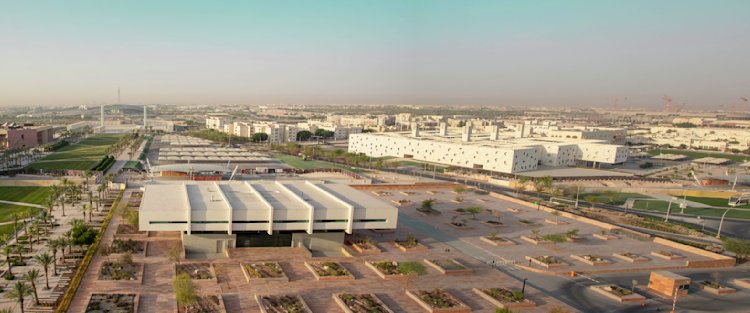
Introduction
Education City, our flagship initiative, is a pretty unique place. During just one short walk—or tram ride—around campus, you could be visiting an Ivy League university, cross the street to browse one of the region’s largest libraries, and then attend an open-mic at the neighboring university behind it.
That’s just how life is when you’re part of the close-knit community at Education City. It’s a place with branch campuses of some of the world’s leading educational institutes, a homegrown research university, start-up incubators, technology parks, heritage sites, cultural institutions, and so much more.
Take a virtual tour
We’re always delighted to share our story, vision, and achievements with people in Qatar and from all over the world. Click below and take a virtual tour through Education City.
Universities and Schools
For K-12 students, we provide various programs ranging from IB-accredited school systems to specialized schools. Our higher education offerings—ranging from undergraduate to postdoctoral degrees—include programs in media, international affairs, business, computer science, medicine, engineering, cultural heritage, knowledge management, and arts.
Designed by some of the world’s leading architects, our spaces are purpose-built for our people and our environments.
Sustaining active lifestyles
Our sports and recreation facilities serve as catalysts for active lifestyle, capitalizing on Qatar’s passion for sports. These sporting facilities will soon be joined by a sports arena that will host the FIFA World Cup 2022, and later function as a health and wellness center for the Education City community.
Learning from our heritage
Education City is home to various centers that are preserving Qatar and the Arab world’s heritage, while promoting lifelong learning and creativity among both the Education City community and the general public.
Growing in inspirational surroundings
The iconic designs of our buildings are a physical manifestation of creativity and innovation, and serve as an inspirational space for our community. The buildings in Education City have been designed by internationally renowned architects like Arata Isozaki, Rem Koolhaas, Antoine Predock and architectural firms Legorreta + Legorreta and Mangera Yvars Architects.
- Netherlands
- Saudi Arabia
- South Africa
- Switzerland
- United Arab Emirates
- United Kingdom
From preschool to PhD, learn how education works in Qatar: your kids’ schooling or your own higher education journey – including language courses.
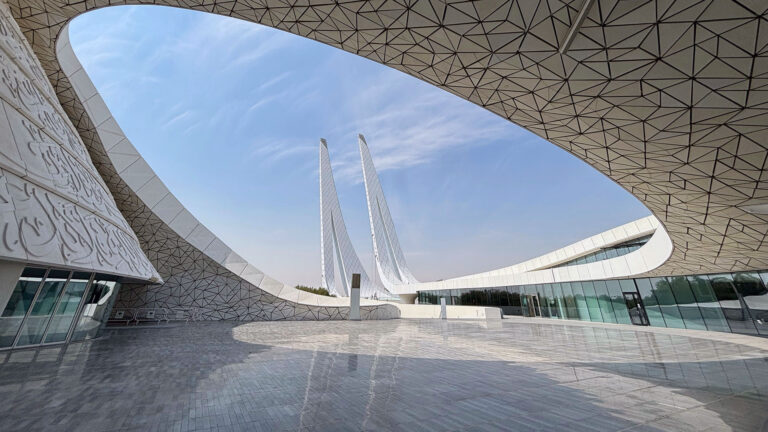
Children's Education
Learn about the education system in Qatar: local public and private schools, international curriculum options, and the calendar of school holidays.
Higher Education
Navigate your higher education journey in Qatar, from choosing the right program and university to transferring your international credits.
Language Learning
Settling into Qatar is much easier when you can talk to the locals. Dive into learning Arabic to unlock a world of culture, communication, and opportunities at every skill level.
Expat tools
Make your expat journey easier with our handy tools
Find a service provider for your finances, education, and everything in between
Health insurance
Get the best health insurance quotes for expats when moving to Qatar
Put yourself out there! Meet expats with similar experiences and find your soulmate

- QNA Twitter
- QNA Facebook
- QNA Instagram
- QNA Youtube
- QNA Telegram
- QNA newsletter
- QNA Google Play
- Miscellaneous
- NewsBulletins
- Live Streaming
- Reports and Analysis
- Photo Albums
- Infographics
- Qatar Vision 2030
- Conferences and Exhibitions
- Media Offices
- Media Organizations
- Department of Foreign Media Affairs
- Open Vacancies
- Terms of Use
- Privacy Policy
Minister of Education Highlights Qatar's Efforts to Invest in Education

New York, September 18 (QNA) - HE Minister of Education and Higher Education Buthaina bint Ali Al Jabr Al Nuaimi underlined that education is a basic right for children both in times of stability and crisis. HE the Minister of Education and Higher Education took part in the "Education and Learning in Times of Emergencies and Protracted Crises" session within the activities of the "Transforming Education Summit", which was called for by the UN Secretary-General to be convened in New York on Sept. 16, 17 and 19. Addressing the session, HE Minister Buthaina bint Ali Al Jabr Al Nuaimi noted that education in times of emergencies represents more than a right for education for children, rather it provides a psychological support and a stability factor to help them overcome the trauma they face every day, and a feeling that life has returned to normal, enhances resilience, supports long-term recovery processes and rebuilds a better future. The Summit's events on Sept. 16 "Mobilization Day" focused on a youth-led and youth-organized mobilization which involved the full participation of a wide range of stakeholders with the aim of conveying the collective recommendations of youth on transforming education to decision and policymakers, informed by the Summit Youth Declaration. It also focused on mobilizing the global public, youth, teachers, civil society, and others to support the transformation of education across the world. Meanwhile, the Summit's "Solutions Day" on Sept. 17 provided a platform for partners to mobilize support to launch or scale up initiatives connected to the Summit Thematic Action tracks. HE the Minister of Education and Higher Education had a significant and effective participation through interventions in three pivotal sessions - Education and Learning in Times of Emergencies and Protracted Crises; Localizing Education for a Sustainable Future; and Financial Innovations: Expanding the Fiscal Space for Education to Finance Learning Recovery. Highlighting Qatar's contribution to the humanitarian and sustainable development projects at the "Education and Learning in Times of Emergencies and Protracted Crises", HE the Minister said that the State of Qatar is a major contributor worldwide, by investing in education, health and economic empowerment. She noted that Qatar Fund for Development (QFFD) has provided nearly $1 billion in grants for educational projects in 64 countries over the past decade, while the Education Above All Foundation has reached more than 10 million children out of school in 56 countries and is constantly expanding its reach and impact. In response to the educational loss resulted by the COVID-19 pandemic, the Education Above All Foundation established a free and multi-discipline creative bank for educational resources, ensuring the continuity of learning for more than 60o,000 children in 170 countries despite the low resources. Moreover, the Foundation and its partners recently launched the "TRACE" data portal to bridge the global gap for reliable, high-quality, accessible data that collects, visualizes, and provides coordinated analysis of data on attacks on education, HE the Minister of Education and Higher Education added. In conclusion of her speech, HE the Minister highlighted the importance of all the gathered parties working to ensure that a higher proportion of development aid and government spending is allocated to the teaching and learning system, in line with the education commitment in times of crisis project; indicating that this is not only a moral duty, but is essential for achieving sustainable development and a safer world for all. "Everyone must work together, side by side, to build education systems that are more resilient in the face of environmental and health crises, violent conflicts and other natural and climate crises that we must inevitably prepare to address," Her Excellency added.
In an opening speech at the "Localizing Education for a Sustainable Future" session, HE Minister of Education and Higher Education Buthaina bint Ali Al Jabr Al Nuaimi focused on the importance of localizing education, paying special attention to the issue of bilingualism, values and identity, and localizing the content of school curricula. HE the Minister expressed her happiness to share the work in this context with Qatar Foundation for Education, Science and Community Development and the Republic of Djibouti, as well as the Regional Office of the United Nations Educational, Scientific and Cultural Organization (UNESCO) in the State of Qatar. She noted that the demographic structure of the State of Qatar includes, in addition to the Qatari citizens, an important number of various other nationalities working in the country and contributing to its national development, making the State of Qatar a multicultural and multilingual environment supportive of coexistence, mutual understanding and peace. The State of Qatar realizes the importance of sustainable development as a necessity to achieve prosperity in the future, establish security and achieve peace in the world, Her Excellency stressed, noting that Qatar is a young country and the majority of its population is young, so it is of great importance to raise and educate citizens open to the outside world, but no less important, to be rooted in their national origins and possess a sense of civic responsibility, values such as pride in and understanding of their culture and heritage, and a strong sense of identity that is based on the values and principles necessary to achieve the benefit of their community, being able and proficient in using Arabic - their mother tongue - communicating with their community and interacting with its challenges, including the challenges associated with sustainability, at the local level, thus ensuring their sense of security and belonging in these complex and difficult times. As part of the "Solution Day" in which multi-stakeholders presented initiatives that will contribute to transforming education, HE the Minister of Education presented an overview of Qatar's "Rasikh" initiative, the new digital learning platform launched by Qatar Foundation in partnership with the Ministry of Education and Higher Education, in cooperation with the Republic of Djibouti and the UNESCO Regional Office in the State of Qatar. This platform connects all teachers and local institutions in the State of Qatar, from the public and private sectors and other key institutions, in a codified mechanism to establish knowledge that can immediately reach the classrooms. The content was developed by teams of educators in the field of general education (kindergarten to twelfth grade) with local expertise in both Arabic and English. The content includes links with the relevant sustainable development goals, and the context of their impact in the State of Qatar with detailed links to the study curriculum to facilitate its use in schools. Her Excellency pointed to the challenges faced by students represented in the lack of modern, updated and most useful contents in the Arabic language, and that by using the "Rasikh" learning platform, Arabic-speaking students will no longer face this problem, while at the same time, non-Arabic-speaking students in the State of Qatar in the private school will be able to access to locally designed and English language teaching materials relevant to the national context. In the session "Financial Innovations: Expanding the Fiscal Space for Education to Finance Learning Recovery", HE the Minister of Education and Higher Education noted the critical importance of the session's focus, which aims to reach solutions related to the fifth course of action, which is education financing, as it is one of the main issues at the Transforming Education Summit. She noted that as everyone approaches the deadline for achieving the Sustainable Development Goals in 2030, countries must deliver on the promises they made to provide quality education for every child, which inevitably requires greater investment in education. "Since many countries have limited financial capacity that does not allow them to increase spending on education, we must search for innovative ways in order to alleviate financial pressures and increase education funding allocations, by devising and proposing solutions Innovative in an effort to deal with the challenges facing education at the global level, through finding the best ways to invest and spend on education effectively and efficiently, whether as a percentage of total spending or as real value," Her Excellency added. Her Excellency highlighted the achievements of the Education Above All Foundation through the Educate a Child program, which was able to finance nearly $950 million out of a total amount of $2.3 billion invested with global partners in providing primary education to more than 14 million children deprived of education around the world. She added that the experience of the Educate a Child program is a living example that we can all imitate to work together, stressing that the possibilities are unlimited in this aspect and will be in the interest of those who have been marginalized educationally. HE the Minister indicated that the State of Qatar strongly supports the calls for donor countries to allocate higher percentages of official development assistance directly to education and training; and that the State also supports the proposed mechanism to allow countries heavily indebted to restructure and reschedule their debts, thus providing part of the debt interest funds. She called on participants from the World Bank to contribute to a better understanding of options for increasing education allocations in budgets, and called on the "Global Partnership for Education" to help develop innovative strategies to increase the financial capacity of education. She also referred to the approach adopted by the State of Qatar towards the issue of financing education at the national and global levels, and that it pays great attention to this issue and has showed its commitment to its students and students of the world by taking a conscious decision to invest in education, stemming from its belief in education as the pillar of social growth. It is worth noting that the State of Qatar, in the context of its support for the call of the UN Secretary-General to convene the Transforming Education Summit, led in May the regional consultative meeting with the Ministers of Education and with development partners, including representatives of UNESCO and UNICEF, and representatives from West Asia. Qatar also held a national consultative meeting in preparation for the Transforming Education Summit, organized by Qatar National Commission for Education, Culture and Science and the Education Above All Foundation, in partnership with UNESCO, UNICEF and more than 50 stakeholders at the College of Islamic Studies in Education City. Qatar's participation in the Transforming Education Summit comes in response to the global crisis in education - which is the crisis of equality, inclusion and relevance - as the summit provides a unique opportunity to raise the level of education to the top of the global political agenda and mobilize action, ambition, solidarity and solutions to restore educational loss associated with the COVID-19 pandemic and sow the seeds for education transformation in a rapidly changing world. The main summit, which will be held on Sept. 19 (Leaders Day), was preceded by side events on Sept. 16 and 17. (QNA)
Qatar Museums Signs MoU with the National Museum of China
Career counselors hub 2024 commences, fire station artist in residence presents art is about art and eternal echoes: the silent cry of gaza exhibitions, ministry of endowments and islamic affairs honors winners of waqf & picture competition, ministry of education launches 'my values draw my identity' project 2024-2027.
Education and Schools in Qatar

- Download our Moving to Qatar Guide (PDF)
Education in Qatar follows a system of distinct levels. After preschool, primary school ranges from Grades 1 to 6, preparatory school from Grades 7 to 9 and secondary school from Grades 10 to 12. Basic education for adults aged 18 and older is also available. Secondary school provides a choice between general education and specialised schools for specific interests, including banking, business administration, and science and technology.
Expats moving to Qatar face myriad challenges, but navigating the emirate’s education system needn’t be one of them. Most expats send their children to one of the many private international schools in the country, and the biggest headache is often having to choose one from the sheer variety of superlative choices.
Parents should research potential schools and apply as soon as possible.
Public schools in Qatar

Public schools in Qatar are generally excellent, as Qatar continues to invest in its education to elevate the knowledge, skills and, ultimately, the lives of its citizens. Although public schools are free for Qatari nationals, schools have their own policies for admitting non-Qatari students.
Useful links
- The official website of the Ministry of Education and Higher Education provides a list of schools that may be a good fit.
International schools in Qatar
Although the government puts significant effort into ensuring high standards at local schools, most expat children attend private international schools in Qatar due to restrictions and language barriers at public schools.
There are many options, with schools following various curricula, including the International Baccalaureate (IB), British, American and Indian systems. These schools must meet the standards of the Qatar National School Accreditation system.
Education can be a significant expense, so expats working in Doha should try to negotiate school fees into their contracts or ensure that they budget carefully. Fees such as tuition and registration fees, uniforms, and excursions can add up quickly, and most fees are expected to be paid upfront at the beginning of the school year.
Enrolment requires long-term planning, as waiting lists are often long and application fees high – and often non-refundable. An application form and previous school documents are usually among the required documents. Some schools also request a letter of recommendation, on-site entrance exams and occasionally interviews.
See our reviews on International Schools in Doha .
Nurseries in Qatar
Qatar recognises the importance of early childhood education, and there are many public and private kindergartens. Private ones may be attached to larger international schools.
The Ministry of Education and Higher Education emphasises that kindergarten should encourage children to be active, creative, and able to question and criticise while developing their own personalities. Young children can explore basic numeracy and science, but focusing on their physical development and creative expression is paramount.
Expats needn’t worry about a language barrier in Qatari nurseries – young kids pick up new languages easily, and the curriculum offers communication in both Arabic and English. All nurseries, both public and private, offer top-quality educational and play materials, as well as experienced teachers.
Special-needs education in Qatar
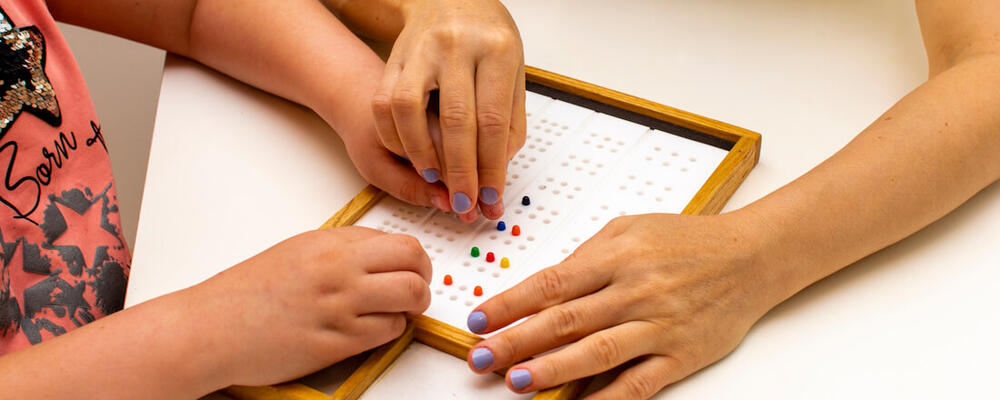
Empowering people with disabilities is one of Qatar’s top priorities, and this includes providing quality special-needs education integrated with mainstream classrooms wherever possible.
Public and private schools provide support for students with learning, physical or developmental disabilities as well as those with behavioural, emotional and communication disorders, including students with autism and intellectual disabilities.
Schools must tailor services to each student. Curricula may be adapted to meet appropriate educational goals, and specialised materials and technology are employed to aid in the learning process. Specialists, alongside teaching staff, are responsible for providing optimal support to children and their parents.
Though schools are becoming increasingly integrated, there are specialised schools that specifically cater to students with disabilities and still provide a comprehensive education programme. Specialised schools include Al-Hidaya schools for students with intellectual disabilities and separate schools for students with hearing impairments.
Homeschooling in Qatar
Homeschooling is an option for Qatari residents. Doha Home Educators (DHE) has been pivotal in creating an organised network for homeschoolers in Doha and regularly organises classroom lessons, activities, and events. Parents who choose this alternative to mainstream schooling in Qatar will find an active community of expats who can be reached online and through social media groups.
Given the vague homeschooling regulations for expats in Qatar, DHE advises parents to follow the regulations of their home country.
Tutors in Qatar
Tutoring in Qatar, like elsewhere around the world, is a popular industry. There are many online platforms to find tutors for a broad spectrum of subjects and curricula – some tutors may focus on IB or IGCSE and A-Levels, while others use the Qatari curriculum. TeacherOn and MyPrivateTutor are among the most commonly used online platforms.
- TeacherOn is an international online service that connects tutors and students for a variety of subjects.
- To have your child matched with a wide range of tutors, try MyPrivateTutor Qatar .
What do expats say about schools in Qatar? "Almost every nation is represented with a local international school, or more than one. Qataris send their children either to local schools or the international ones as well." Get some insights into schools in our interview with Oliver , a German expat in Qatar.
Further reading
►For info on the capital city, read about Education and Schools in Doha
►Read up on Accommodation in Qatar
Are you an expat living in Qatar?
Expat Arrivals is looking for locals to contribute to this guide, and answer forum questions from others planning their move to Qatar. Please contact us if you'd like to contribute.
Expat Health Insurance
Cigna Global Health Insurance Moving your family abroad can be intimidating, but learning about medical options such as family health insurance early on can help you successfully settle in. Comprehensive family coverage, wherever you go Paediatric coverage for well-child visits & immunisations Access to dental and orthodontic care 24/7 multilingual customer service Get a quote from Cigna Global
Aetna Aetna International, offering comprehensive global medical coverage, has a network of 1.3 million medical providers worldwide. You will have the flexibility to choose from six areas of coverage, including worldwide, multiple levels of benefits to choose from, plus various optional benefits to meet your needs. Get your free no-obligation quotes now!
Moving Internationally?
International Movers. Get Quotes. Compare Prices. Sirelo has a network of more than 500 international removal companies that can move your furniture and possessions to your new home. By filling in a form, you’ll get up to 5 quotes from recommended movers. This service is free of charge and will help you select an international moving company that suits your needs and budget. Get your free no-obligation quotes from select removal companies now!
Free Moving Quotes ReloAdvisor is an independent online quote service for international moves. They work with hundreds of qualified international moving and relocation companies to match your individual requirements. Get up to 5 free quotes from moving companies that match your needs. Get your free no-obligation quotes now!


- News & Insights
- Education System
- Grading System
- Credentials
- Universities
Primary Education
Education is Qatar respects the tradition and conservative nature of its people, while espousing latest technology and pedagogic methods. While the 6 years of primary education are compulsory, all state schooling is free. Unusually, private schools are actively encouraged too, with all costs covered.
Middle Education
Three years of middle school follow, where a standard academic curriculum is followed at all state and private schools.
Secondary Education
There are 19 secondary schools for boys, and 22 for girls, as well as a number of private ones of both kinds. The government is experimenting with alternatives to general education, and has recently opened two scientific secondary schools.
Vocational Education
The department of training and vocational development supplies the nation’s skilled and semi-skilled requirements. More recently programs were introduced to train girls in secretarial and general office skills.
Tertiary Education
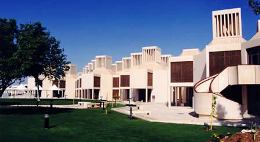
Qatar is welcoming 102 countries visa-free, check your visa status here .
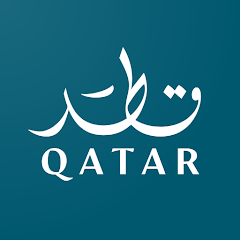
Visit Qatar App Explore things to do in Qatar!
Get eVisa info
Select your language
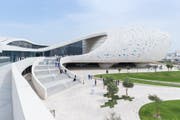
Education in Qatar
If you’re thinking about studying in qatar, you’re making the right choice.
Qatar’s higher education institutions make it thriving, forward-looking place to study with international, diverse universities at the forefront of cutting-edge research. With a community of local students as well as international students hailing from all over the world, embrace the opportunity for world-class education and research opportunities to pursue your own academic journey in Qatar.
An extensive range of fields, programs of study and degrees makes Qatar an outstanding option for students.
Qatar University, the national state university, is a beacon of academic and research excellence in the region with a wide range of undergraduate and postgraduate options on offer.
Several leading international universities have established joint ventures and branch campuses with Qatar Foundation offering students the opportunity to access world-class facilities and faculty from around the world.
Hamad Bin Khalifa University (HBKU), a member of Qatar Foundation, is a homegrown research and graduate studies university that acts as a catalyst for positive transformation in Qatar and the region while having a global impact.

Become part of a dynamic international community, studying in a flourishing global city full of opportunities. Those choosing Qatar to study will find a dynamic, welcoming destination where they can make their future an exciting reality.

Study programmes
Qatar offers an exceptional range of world-class, prestigious educational programmes and opportunities. Learn more about the many undergraduate, graduate and PhD programmes available at Qatar University, Hamad Bin Khalifa University, Qatar Foundation’s Partner Universities, and other higher education institutions.
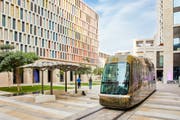
Student scholarships
Qatar is home to some of the best international universities. Its strategic geographic location and scholarship and funding opportunities make the destination suitable for students from across the globe.
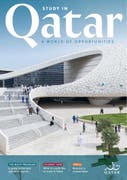

Study in Qatar magazine
Get your journey started and prepare to study in Qatar. Look through the 'Study in Qatar' magazine for all the information you're looking for.
Visas and permits
Find a bank, must know informaion.
For a list of all universities and contact details - contact us
Continue to explore
Things to do
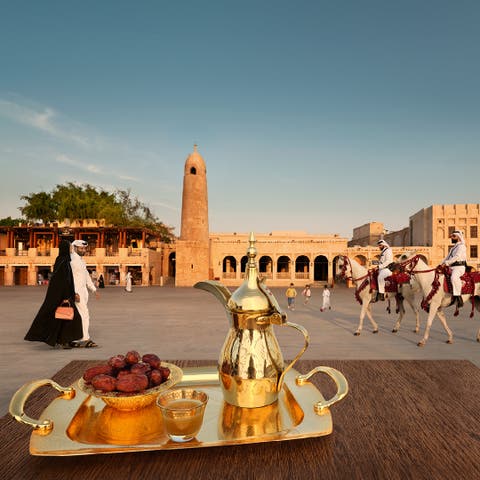
Art & culture

Adventure & sports

Things to know before travelling
Want to travel visa-free? Check if you qualify here.
Getting here
Planning your trip to Qatar? Check how to get here.
Travel tips
Make the most of your visit with our handy travel guide.
Getting around
From a dhow boat to our world-class metro, here’s how to easily explore Qatar.
- Latest edition
- Media Centre
- Terms & conditions
- Privacy notice
- Corporate website
- Amiri Diwan
- Cookie policy
- Qatar Tourism brand logos
- Subscribe to our newsletter
- Cookie settings
© 2024 Qatar Tourism | All rights reserved

Official websites use .gov A .gov website belongs to an official government organization in the United States.
Secure .gov websites use HTTPS A lock ( A locked padlock ) or https:// means you’ve safely connected to the .gov website. Share sensitive information only on official, secure websites.
- Search ITA Search
- Market Overview
- Market Challenges
- Market Opportunities
- Market Entry Strategy
- Architecture, Engineering, & Construction
- Defense, Aerospace, and Security
- Education Training and Equipment
- Information and Communication Technology
- Medical Equipment and Services
- Oil & Gas Field Machinery Equipment
- Trade Barriers
- Import Tariffs
- Import Requirements and Documentation
- Labeling/Marking Requirements
- U.S. Export Controls
- Temporary Entry
- Prohibited & Restricted Imports
- Customs Regulations
- Trade Standards
- Trade Agreements
- Distribution and Sales Channels
- Selling Factors and Techniques
- Trade Financing
- Protecting Intellectual Property
- Selling to the Public Sector
- Business Travel
- Investment Climate Statement
Capital: Doha
Population: 2.5 million (July 2021 est.)
GDP (Purchasing Power Parity): $245.7 billion (2020 est., in 2017 dollars)
Currency: Qatari Rial (QAR)
Language: Arabic (Official), English (commonly used as second language)
UNESCO Student Mobility Number
Qatar has 8,527 students studying abroad according to UNESCO.
CIA World Factbook
24.62% of the population in Qatar is under 25 years old.
Education in Qatar continues to expand due to a strong government commitment to create “an educated population,” with substantial investment in the sector, a rising youth population, and continued increases in school and university enrollment. In 2020, Qatar allocated $6.07 billion to the education sector, which represented 10.5% of the total budget. According to Boston Consulting Group, the private education market is expected to grow to $2.4 billion by 2023. Qatar National Vision 2030 highlights the state’s goal to expand and improve the education system and promote the “Qatarization” of the workforce, which would require Qatari students to gain sufficient knowledge and skill sets from their educational institutions. As of the 2019-20 academic year, there were 166 secondary schools (private and public) serving 52,161 students. Public schools are free-of-charge, generally separated by gender, and are preferred by Qatari families for primary and secondary levels.
In public and private institutions, the levels of formal learning are pre-primary, primary, preparatory, and secondary schools. The recent trend in Qatar’s education is towards choosing private institutions, the enrollments of which are likely to grow compared to the present-day preference of public institutions. Private schools offer multiple international curricula (like IB and A-levels) and focus on studies in English, which potentially prepares Qatari students for study abroad education, specifically in the United States. There were more than 332 private schools operating in Qatar in the 2019-2020 academic year.
Qatari male students are increasingly aiming to study in private institutions and a majority of the female students are enrolling in public institutions in Qatar with a focus on studying subjects in Arabic and pursuing a national curriculum. Therefore, the majority of Qatari nationals in public universities are women, while more men either pursue careers or choose to go abroad for higher education. There were 32 universities in Qatar with 39,000 students registered during the 2019-2020 academic year.
Qatar hosts six American universities (Carnegie Mellon University, Weill Cornell Medicine, Georgetown University, Virginia Commonwealth University, Texas A&M University, and Northwestern University), which accept both nationals and expatriate students. A key player in these international collaborations is Qatar Foundation , a non-profit that stays at the forefront of Qatar’s educational development and consists of more than 50 entities working in education, research, and community development. Higher education covers many areas, such as the humanities, medicine, science, engineering, education, and Islamic studies. However, there is a lack of diversity within master’s degree programs, including professional development opportunities like law school, or specialized schooling like aviation. Qatar is also actively looking to increase the enrollment rates for post-secondary education and raise the graduation rates for nationals studying STEM (math, science, and engineering, specifically) and IT disciplines. These trends and needs are shaping the demand in this market and could be used as recruitment opportunities for U.S. institutions.
The Supreme Education Council (SEC) and Ministry of Education & Higher Education (MOEHE) are the two government agencies supporting and regulating education in Qatar.
Government Scholarships: A distinctive feature of the Qatari education system is the availability of scholarships for Qatari nationals for a selected number of universities for undergraduate and graduate studies. The scholarships are provided by the state of Qatar. The Ministry of Education & Higher Education is the regulatory body that supervises the process of choosing the institutions where Qataris are eligible to receive financial support. The list of universities approved for the scholarships can be found here: https://www.edu.gov.qa/en/Deputy/HEaffairs/Pages/UnischolarshipeOut.aspx .
SUB-SECTORS
Higher Education: There were 562 students from Qatar studying in the United States during the 2020-2021 academic year, according to the IIE Open Doors Report. This is a 16.1% decrease than the previous year; however, this mirrors the overall decline in international students studying in the U.S. for the 2020-2021 academic year (15% decrease in the international enrollment rate).
The academic level segmentation is as follows:
- Undergraduate Education: 459 students, a 17.1% decrease since the last academic year.
- Graduate: 73 students, a 2.7% decrease since the last academic year.
- Non-Degree Studies: 12 students, a 61.3% decrease since the last academic year.
- Optional Practical Training (OPT): 18 students, an 80% increase since the last academic year.
According to Qatar’s Education Statistical Profile 2019-2020, study abroad students preferred to pursue studies in engineering, economics and accounting, business administration, computer science, politics, international and public relations, medical and paramedical specialties, and law.
Secondary Education: Statistics are not available for education abroad for secondary school students. While it is evident that Qataris prefer public education within the country, the growth of enrollments is larger for private institutions. The enrollment rate at public institutions has remained consistent.
Online Programs: There could be opportunities in e-learning and executive education.
Research and Development: There is a Research, Development, and Innovation (RDI) division of the Qatar Foundation (QF). QF is the main center for research and development in Qatar and includes the Qatar Science & Technology Park, which consists of the Arab Innovation Academy, multiple accelerators, and innovation hubs that provide funding for projects. Qatar Foundation, Qatar University, and research centers of private education institutions (for example the Center of International and Regional Studies at Georgetown University in Qatar) comprise the main R&D facilities in the country. Given the small size of the country and population, the research and development opportunities are limited.
Professional Training Services: Most professional training services are provided by private entities, with several exceptions that can be found in ministries and government institutions, such as the Educational Training and Development Center supervised by the Ministry of Education and Higher Education (MOEHE). In 2018, there were 24,000 Qatari male trainees and 25,000 Qatari female trainees. Both indicators have increased consistently since 2013. Some of the most popular fields of training are air transport, management training, occupational safety, oil and gas, IT, and teacher training. Overall, Qatari society seems welcoming of the specialization and training opportunities that would give students a chance to stay in Qatar during their school and university years to advance in their fields of study. Considering the national priority for an educated population and capable workforce, training for new and popular areas of studies such as business, STEM, and IT, could have a potential for success in Qatar.
Education Technology: Qatar has been at the forefront of digital transformation and a top country in the region for technological advancement. However, there could be opportunities for advanced and disruptive technology in the EdTech segment.
OPPORTUNITIES
The best prospects in Qatar are in recruitment for programs at the undergraduate and graduate levels. There could be opportunities for community colleges, particularly to recruit potential students from the expatriate community. In addition, collaborative opportunities may exist for companies in skills development and training for the workforce in the energy, hospitality, and ICT sectors. The government has plans to establish multiple K-12 schools, which may provide opportunities for school management and school operation service providers.
DIGITAL MARKETING STRATEGIES
The popular platforms used by students are Google Duo, Google Meet, Zoom, and MS Teams.
The most popular social media sites used by students in Qatar are WhatsApp, Instagram, Google+, Twitter, Snapchat, YouTube, and Facebook. LinkedIn is used by students to search for job opportunities. YouTube and TikTok are popular for streaming videos. Local and international education institutions use various social media sites to provide information to potential students and recruit students for higher education.
- 1324th International Conference on Education and Social Science http://iser.co/Conference2022/Qatar/1/ICESS/
- International Society for Engineers and Researchers Conference - for the promotion of international education and university cooperation in the fields of science, engineering, and technology Doha, Qatar July 10 - 11, 2022 http://iser.co/
- University Expo Qatar - a comprehensive two-day exhibition attended by students age 16+ who are considering their higher education options, as well as their parents and teachers Oct. 19-20, 2022 https://informaconnect.com/uniexpoqatar/
- U.S. Commercial Service – Qatar: https://www.trade.gov/qatar/
- U.S. & Foreign Commercial Service Global Education Team: https://www.trade.gov/education-industry
- Industry and Analysis, Office of Supply Chain, Professional & Business Services: https://www.trade.gov/professional-and-business-services
- Ministry of Education & Higher Education: https://www.edu.gov.qa/en/Pages/HomePage.aspx
U.S. COMMERCIAL SERVICE CONTACT
Srinivasa Murthy, Commercial Advisor
U.S. Commercial Service – Doha, Qatar
Phone: +974 4496 6730
Email: [email protected]

Universities

Search Edarabia
- United Kingdom
- United States
- Saudi Arabia
- MBA Rankings
- More Countries
- Special Education Schools
- After School Activities
- Educational Suppliers
- Language Schools
- Music & Performing Arts
- Training Centers
- Education News
- Recruitment Agencies
- Student Scholarships
- Login / Register
List of 96 Best Schools in Qatar (2024 Fees)
With a population of 2,576,181, Qatar is a sovereign country located in the Middle East. Qatar is a high income economy, backed by the world's third largest natural gas and oil reserves. When it comes to education , private schools attract most expat children, and Qatar offers great academic facilities and value for money.
Related Articles:
- Nurseries in Qatar
- School Fees in Qatar
- School Holidays in Qatar
- Public Holidays in Qatar
- Things to do in Qatar
Which government bodies regulate the education system in Qatar?
Schools in Qatar are governed by the Qatar Ministry of Education and the Supreme Education Council. Apart from this, there are also many privately managed independent schools, as well as Qatar international schools. These are mostly for English speaking western expatriates with varying international curriculum. Most schools are located in Doha, the capital of Qatar. Schooling in Doha allows students to enjoy the privilege of studying at prestigious schools with a diverse expat population.
How many schools are there in Qatar?
There are approximately 338 international curriculum schools operating in Qatar.
What are some facts about schools in Qatar?
- Independent schools teach both Arabic and English
- Academic Bridge Program offers a university preparatory program that aims to equip top calibre secondary school graduates for admission to degree programs
- The Learning Center is a school meant for students who experience learning difficulties. It assists students to develop compensatory skills for individual learning differences.
- Qatar Academy includes both primary and senior school for international education for boys and girls from pre-school level to university entrance. The Qatar Academy is accredited by US-based New England Association of Schools and Colleges, and also the Europe based Council of International Schools .
Below is a comprehensive list of all schools in Qatar (Doha, Abu Dhalouf, Abu Hamour, Abu Samra, Ad Dawhah al Jadidah, Ain Khaled, Ain Sinan, Al Aziziya, Al Bidda, Al Daayen, Al Dafna, Al Ebb, Al Egla, Al Gharrafa, Al Ghuwariyah, Al Hilal, Al Jasrah, Al Jeryan, Al Karaana, Al Kharaitiyat, Al Kharayej, Al Kharrara, Al Kheesa, Al Khor, Al Khulaifat, Al Luqta, Al Mamoura, Al Mansoura, Al Markhiyah, Al Mashaf, Al Masrouhiya, Al Mearad, Al Messila, Al Mirqab, Al Najada, Al Nasraniya, Al Qassar, Al Rufaa, Al Sadd, Al Sailiya, Al Sakhama, Al Seej, Al Shagub, Al Souq, Al Tarfa, Al Thakhira, Al Themaid, Al Thumama (Al Wakrah), Al Thumama (Doha), Al Utouriya, Al Waab, Al Wajba, Al Wakrah, Al Wukair, Al Zubarah, Al-Shahaniya, Ar Ru'ays, As Salatah, Baaya, Bani Hajer, Barahat Al Jufairi, Bu Fasseela, Bu Samra, Bu Sidra, Dahl Al Hamam, Doha Port, Duhail, Dukhan, Fereej Abdel Aziz, Fereej Al Amir, Fereej Al Asiri, Fereej Al Asmakh, Fereej Al Manaseer, Fereej Al Murra, Fereej Al Nasr, Fereej Al Soudan, Fereej Al Zaeem, Fereej Bin Durham, Fereej Bin Mahmoud, Fereej Bin Omran, Fereej Kulaib, Fereej Mohammed Bin Jassim, Fuwayrit, Gharrafat Al Rayyan, Hamad Medical City, Hazm Al Markhiya, Industrial Area, Izghawa (Al Rayyan), Izghawa (Umm Salal), Jabal Thuaileb, Jelaiah, Jeryan Jenaihat, Jeryan Nejaima,, Khawr al Udayd, Leabaib, Lebday, Lejbailat, Lekhwair, Leqtaifiya (West Bay Lagoon), Lijmiliya, Luaib, Lusail, Madinat Al Kaaban, Madinat ash, Shamal, Madinat Khalifa North, Madinat Khalifa South, Mebaireek, Mehairja, Mesaieed, Mesaieed Industrial Area, Mesaimeer, Muaither, Muraikh, Mushayrib, Najma, New Al Hitmi, New Al Mirqab, New Al Rayyan, New Fereej Al Ghanim, New Fereej Al Khulaifat, New Salata, Nu`ayjah, Old Airport, Old Al Ghanim, Old Al Hitmi, Old Al Rayyan, Onaiza, Ras Abu Aboud, Ras Lafan, Rawdat Al Hamama, Rawdat Al Khail, Rawdat Egdaim, Rawdat Rashed, Rumeilah, Sawda Natheel, Shagra, Simaisma, The Pearl, Umm Bab, Umm Birka, Umm Ghuwailina, Umm Lekhba, Umm Qarn, Umm Salal Ali, Umm Salal Mohammed, Wadi Al Banat, Wadi Al Sail, Wadi Al Wasaah, Wadi Lusail).
Edarabia showcases all private schools in Qatar through which parents can filter by tuition fees, curriculum, rankings & ratings. There are many public, private and charter schools near you that cater to both expat and local students.
Depending on the level of education; kindergartens (pre-schools), primary, secondary and high schools will all have varying tuition fees. Most K-12 schools offer different curriculums and extra-curricular activities to support the intellectual and physical wellbeing of students. Admissions for the top international schools in Qatar tend to have waiting lists so it is recommended that parents apply well in advance to secure a spot for their children. Additionally, each school has ratings based on parent reviews and are ranked below accordingly.
For more details, please click here

American School of Doha
- Address: Al Bustan Street/ E Ring Road, Al Waab/ Al Soudan District SW Quadrant
- Founded: 1988
- Curriculum: IB, American

ACS Doha International School
- Address: Al Kheesa
- Founded: 1967

The Hamilton International School
- Address: Mesaimeer Area (near the Religious Complex)
- Founded: 2019
- Curriculum: American

Arab International Academy
- Address: AL Sadd Area, Sports Roundabout
- Founded: 2016
- Curriculum: IB

Doha College, Al Wajba Campus
- Address: Al Niser Street
- Founded: 1980
- Curriculum: UK EYFS, IGCSE, GCSE, British

Belgravia High School Doha
- Address: Sports City St
- Founded: 2012
- Curriculum: IGCSE, British

Swiss International School (SISQ)
- Address: Al Hashimiya Street

King’s College Doha
- Address: Building 14, Umm Al Shawil Street Zone 47, Al Thumama

Nord Anglia International School - Al Khor
- Address: Taimiyah Street Building 5 Zone 74
- Curriculum: British

Sherborne Qatar
- Address: Umm Al Maa Street, Al Rayyan
- Founded: 2009
- Curriculum: UK EYFS, IGCSE, British

GEMS American Academy Qatar
- Address: Mian St., Al Wukair, Al Wakrah

GEMS Wellington School
- Address: Mian St., Al Wukair, Al Wakrah, Al Mashaf, Al Wukair, Al Wakrah

United School International
- Address: Viva Bahriya Roundabout The Pearl
- Founded: 2022
- Curriculum: IGCSE, GCSE, British

Queen's Qatar
- Address: Zone 33, Street 940, Building 41 Al Markhiya
- Founded: 2024

Doha Modern Indian School
- Address: Mesaimeer Street, Abu Hamour
- Curriculum: CBSE

English Modern School
- Address: Wakra and Al Khor
- Founded: 1991
- Curriculum: IGCSE

International School of London - Qatar
- Address: North Duhail
- Founded: 2008

Michael E. DeBakey High School
- Address: Raodh Alain Street,Al Messila South

Qatar International School
- Address: United Nations Street, Al Dafna
- Founded: 1977

SEK International School Qatar
- Address: Onaiza 65
- Founded: 1892

The Cambridge School, Doha
- Address: AL Maadeed Street , Mamoura
- Founded: 2001

Doha English Speaking School
- Address: Al Maarri Street No. 940, Fereej Kulaib, Zone 35
- Founded: 1971
- Curriculum: UK EYFS, IGCSE, IB, British

MES Indian School
- Address: Building no 16, mesaimeer
- Founded: 1974

Park House English School
- Address: Mesaimeer Road, Abu Hamour,
- Founded: 1994

Dukhan English School
- Address: Near to L Type Park
- Founded: 1950
- Curriculum: UK EYFS, MOE, IGCSE, British
Trending Articles


- Entry Requirements
- Tuition Fees
- Application
- Early Years
- Arabic Studies
- How We Teach
- Collaborations
- Social purpose
- Discover more
- Parent Essentials
EDUCATION IN QATAR
Qatar has a good number of schools however with the increasing population they are in high demand, and vary significantly in curriculum offered, qualifications of teachers and quality of education provision.
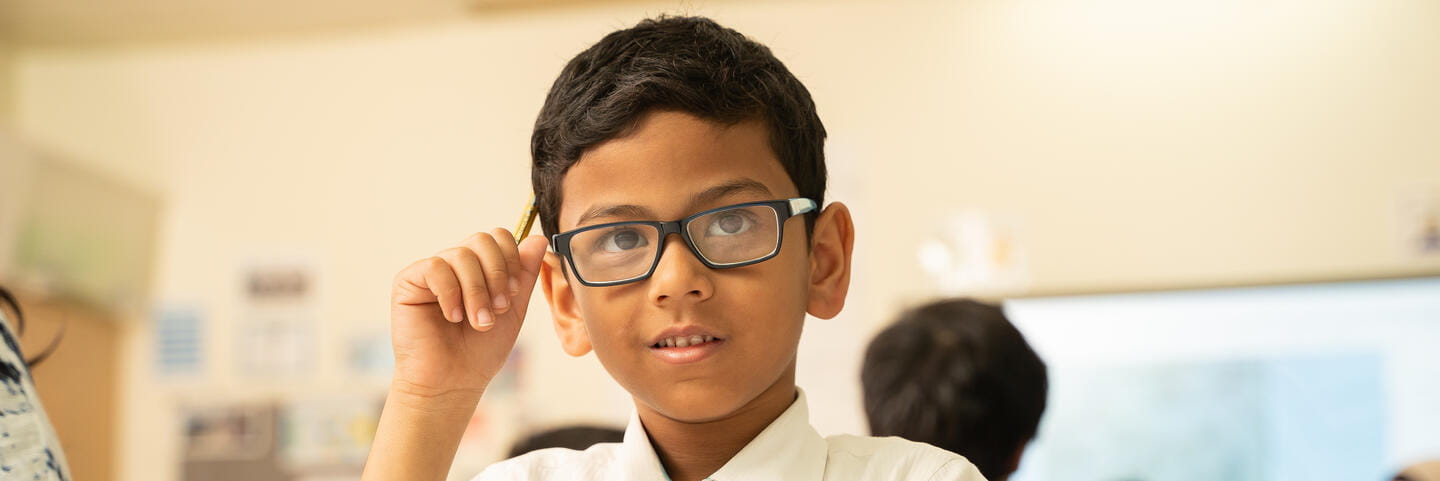
When choosing a school in Qatar for your child, consider the following:
- What type of school are you looking for? Qatar has some good options for international schools, but consider the following factors to decide if it's a credible choice and the right choice for your child.
- Look at the success rates of the schools. Do they have information freely available about their success rates and academic achievements?
- Does the school have a good reputation? What do other people say about the school? Talk to other parents and seek their advice and recommendations. You can do this online before you arrive, or by asking fellow employees within your company.
- What qualifications and curriculum does the school offer? Do you want your son or daughter to follow a particular curriculum such as the International Primary Curriculum, the British National Curriculum, IGCSEs or IBDP?
- Are the teachers and staff at the school suitably qualified and trained? Teachers at Nord Anglia International School, Al Khor are rigorously checked during the recruitment process and have access to excellent training programs.
- What opportunities are there for progression? Different schools cater for different age ranges so depending on how long you plan to stay in Doha, you might want to think about progression to secondary education. Our campus caters for children from early years through to A level (from September 2018).
- Is the school in a good location? How far is it from your neighbourhood or your employer? Travelling during rush hour can be challenging, so proximity is an important factor to consider.
When applying for schools in Qatar, there will often be an application fee, and the paperwork can be quite daunting. Give yourself plenty of time to make enquiries before you arrive if possible.
If you can't make arrangements before you arrive in Qatar, you may want to consider support for home-schooling until a suitable place becomes available.
LIFE IN QATAR
Discover everything you need to know about moving to and living in Qatar.
.png?h=734&iar=0&w=1338&rev=c8f099a630204a4c928cb0211253d4c3&hash=62D20D4BB0F6E7D531DF4A256A29919A)
Want to hear from us?
By joining our mailing list, we can keep you up to date with any future newsletters, events and announcements from our family of 80+ premium schools.
Admissions direct line: +974 4437 9660
Admissions WhatsApp: +974 5029 4726
Nord Anglia International School Al Khor Building 5 Taimiyah Street Zone 74 Al Khor Qatar
- About Nord Anglia
- About Our School
- Global Campus
- Our Global Network
We use cookies to improve your online experiences. To learn more and choose your cookies options, please refer to our cookie policy .
– APPLY NOW!

- Art History (BA)
- Graphic Design (BFA)
- Interior Design (BFA)
- Painting + Printmaking (BFA)
- Kinetic Imaging (BFA)
- Graduate Program : Design (MFA)
- Art Foundation
- First Year Introduction (FYI)
- Liberal Arts & Sciences
- Honors Program
- Film and Design
- Islamic Art History
- Multiversity
- Academic Advising
- Student Employment
- Opportunities
- Commencement
- Portfolio Requirements
- International Students
- Transfer Applicants
- Returning Students
- Laptop Requirements
- Graduate Admissions
- Scholarships, Loans & More
- Contact Admissions
- Academic Calendar
- Policy, Resources & Laws
- Degree Requirements
- Course Schedule and Registration
- Cross Registration
- Transfer and College Credit
- Academic Standing
- About Graduating
- Transcripts, Certifications & Other Requests
- Paying for Studies
- For Further Questions
- VCUarts Qatar Funding
- VCU Funding
- Qatar Research, Development and Innovation (QRDI)
- External Funding
- Sponsored Proposals + Awards
- Partnerships
- Integrity and Compliance
- Policy Database
- Institute for Creative Research
- VCUarts Qatar Libraries
- Innovative Media Studios
- Materials Library
- Writing Center
- Digital Design + Fabrication
- Strategic Partnerships
- Our Stories
- Tasmeem Doha
- Islamic Art Symposium
- Experience Life at VCUarts Qatar
- Resources for Students
- New Student Orientation
- Student Housing & Transportation
- Clubs and Organizations
- Student Leadership Development
- International Student Services
- Learning & Community Engagement
- Personal Development & Counseling
- New Student Arrival
- Accreditation
- Campus Safety
- Life in Qatar
- Stay Connected
- Your Career
- Alumni Grant
- Alumni Giveback
- The Gallery at VCUarts Qatar
- Register Online
- Become an Instructor
- Portfolio Development Program
- Connect with Us
Quick Links
- VCUarts Richmond

VCUarts Qatar Organizes Panel Discussion on the Impact of Generative AI in University Education
- Education City
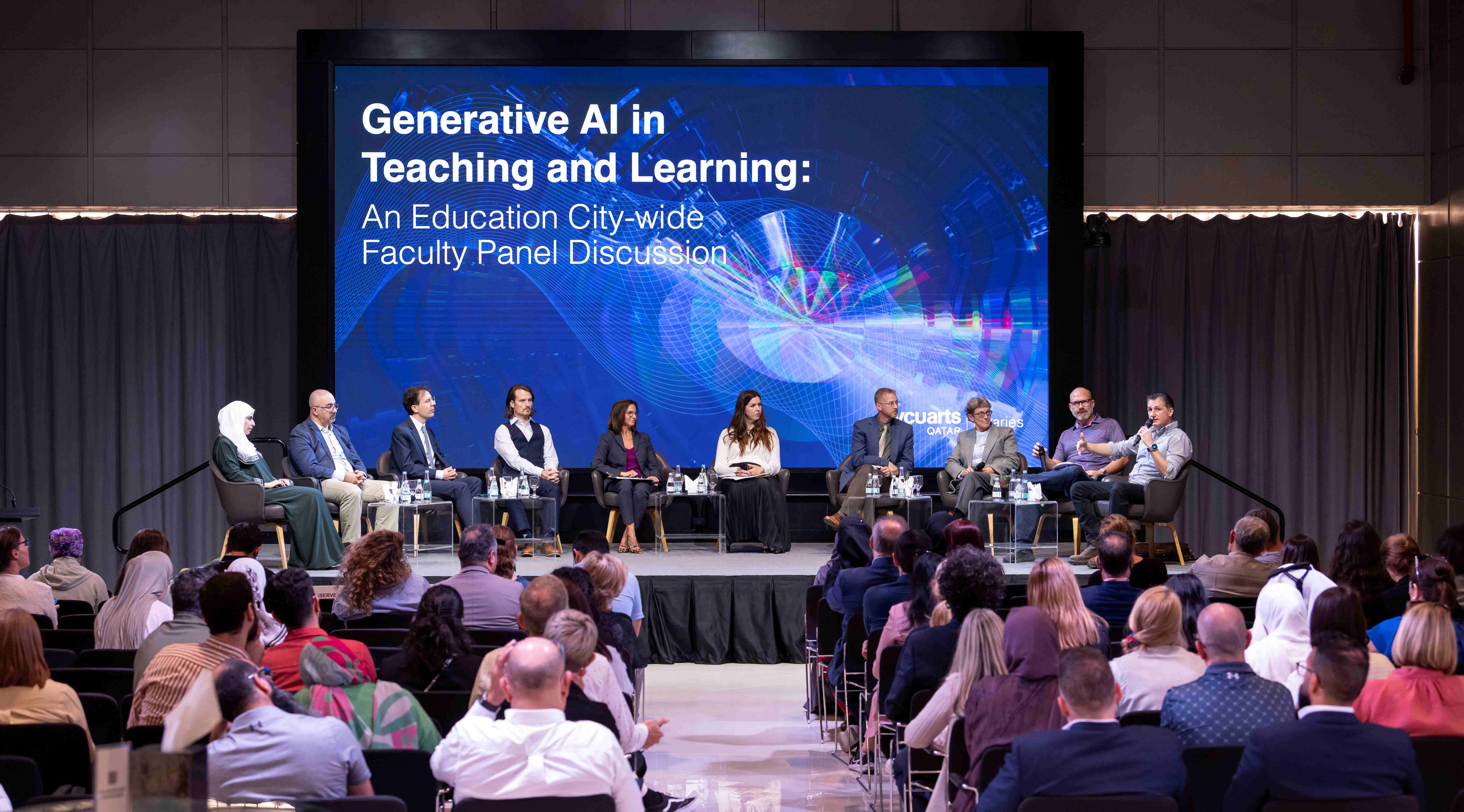
Participants from various QF Education City universities discussed the far-reaching effects of generative AI on academics, including the opportunities and challenges it presents on a daily basis.
The Library at VCUarts Qatar recently organized a panel discussion on the use of Artificial Intelligence (AI) in the context of teaching and learning in higher education.
Titled ‘Generative AI in Teaching and Learning: An Education City-wide Faculty Panel Discussion’, the panel comprised of faculty from Qatar Foundation partner universities in QF’s Education City. The event was held at VCUarts Qatar.
The panelists were Rawan AlSaad, Ph.D., Weill Cornell Medical College, Cornell University – Qatar; Chadi Aoun, Ph.D., Carnegie Mellon University in Qatar; Jörg Matthias Determann, Ph.D., VCUarts Qatar; Sam Meekings, Ph.D., Northwestern University in Qatar; James Cleon Olsen, Ph.D., Georgetown University in Qatar; Jesse Payne, VCUarts Qatar; Mary T. Queen, Ph.D., Texas A&M University at Qatar; and, Spencer Striker, Ph.D., Northwestern University in Qatar.
The discussions were moderated by the organizers of the event, Jacqulyn Ann Williams, Ph.D., Head of Teaching, Learning, and Strategic Initiatives and Associate Professor, Library, and Nicole Abiad, Writing Center Coordinator, Library, from VCUarts Qatar.
The well-attended event saw the discussants touch on the challenges and advantages of using generative AI within academics.

Amir Berbić, Dean of VCUarts Qatar, opened the session, “The integration of AI in education is not merely a trend; it is a transformative force that has the potential to redefine how we teach, learn, and interact within our academic environments. Together, we can explore how to harness the potential of AI to enrich teaching and learning, and ultimately, to foster a more effective and equitable educational experience for all.”
Some of the topics discussed were the existence, or lack, of university policies regarding the use of generative AI within classrooms, student disclosures with regard to the use of AI in academic projects, the opportunities that AI creates in university teaching and learning, the impact of AI-related university policies on individual faculty’s teaching, the relationship between AI, copyright and Intellectual Property rights, AI and data privacy and liability, and how data is used by AI tools, to name a few.
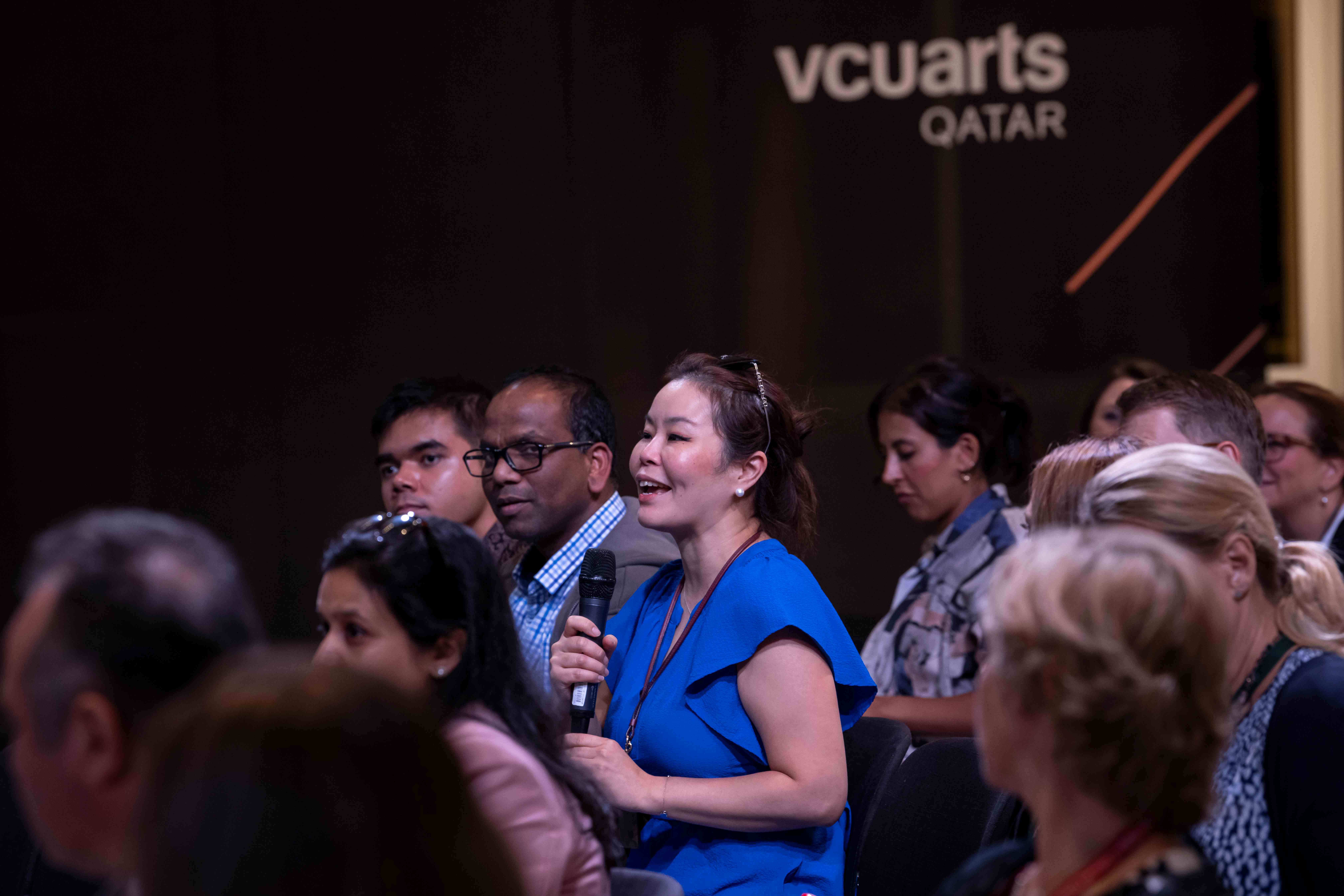
Williams said, “The EC-wide faculty panel discussion on generative AI in teaching and learning was a successful multiversity event and a powerful reminder of the uniqueness of the Education City model. The 130+ faculty attendees who joined us and enriched our discussion with their thoughtful questions and contributions made the session even more impactful.
“During the event, faculty and experts with different disciplinary expertise and experience discussed institutional policies, ethics, opportunities, challenges, and their approaches to using AI in the classroom. Key takeaways from the discussion include developing students’ critical AI literacy skills, discussing responsible usage of AI in the classroom to ensure students are equipped with the knowledge to use AI ethically, and incorporating AI as a collaborative tool, focusing on how AI can augment human creativity, originality, and ingenuity.”
- Artificial Intelligence
- panel discussion
Executive Education
SFS’s Institute for the Study of Diplomacy offers executive master’s programs in diplomacy and international affairs that were developed in consultation with the Ministries of Foreign Affairs in Qatar and Indonesia, along with the Georgetown Leadership Seminar. The McDonough School of Business offers a joint master’s degree with the School of Foreign Service in international business and policy.
Executive Master in Diplomacy and International Affairs (Qatar)
The one-year Executive Master in Diplomacy and International Affairs (EMDIA) program seeks to enhance the ability of practitioners from Qatar and the Middle East region to formulate and implement effective foreign policy.
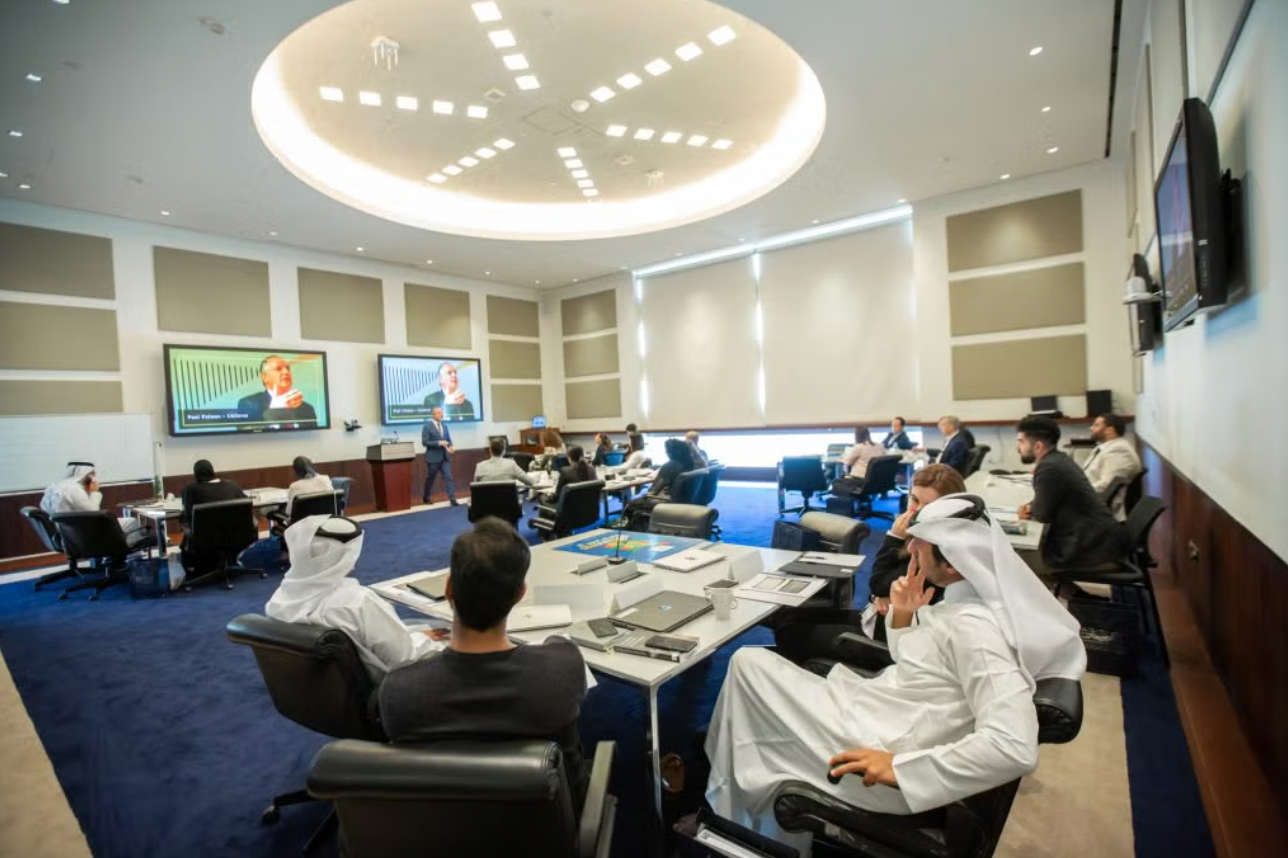
Executive Master in Diplomacy and International Affairs (Asia-Pacific)
The one-year Executive Master in Diplomacy and International Affairs (EMDIA) program is designed to cultivate future leaders in the Asia-Pacific and equip Indonesian civil servants and regional practitioners with essential skills to tackle global and regional challenges.
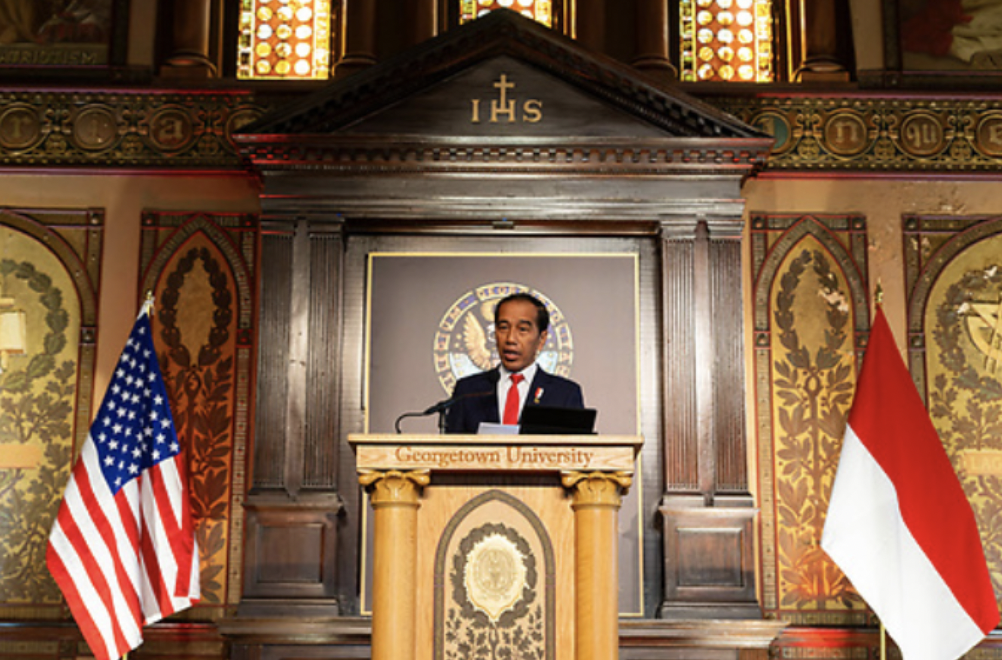
Master of Arts in International Business and Policy
The Master of Arts in International Business and Policy (MA-IBP) offered by the School of Foreign Service and the McDonough School of Business provides working professionals with the opportunity to develop a deeper understanding of the drivers in business and international relations with the context of contemporary global issues.
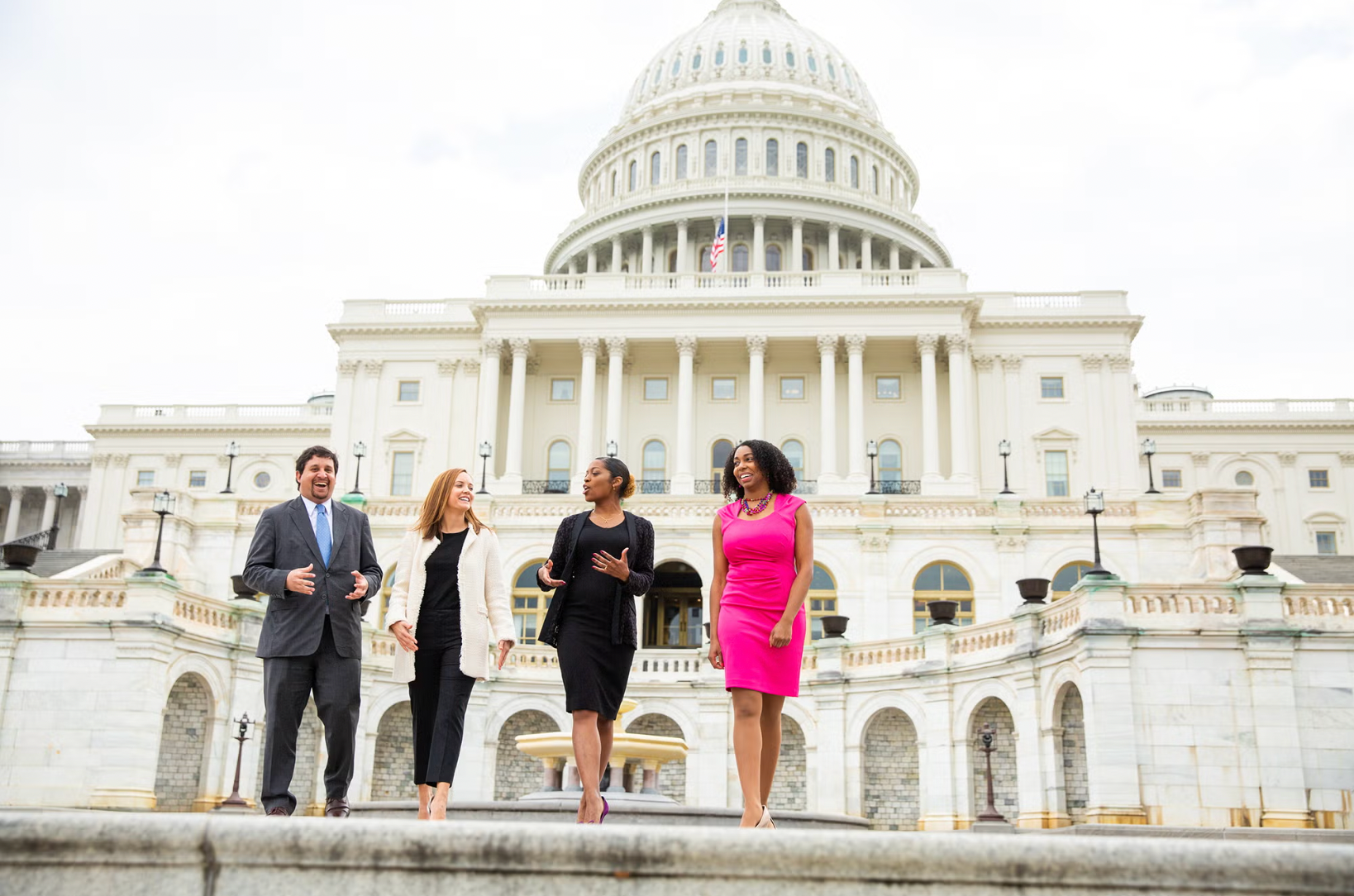
Georgetown Leadership Seminar
The Georgetown Leadership Seminar’s vision is to promote dialogue on global affairs among individuals who will shape the future of their organizations and countries.


IMAGES
VIDEO
COMMENTS
In 2001, Qatar hired the RAND Corporation to analyse and reform its K-12 education system due to uncertainties over the quality of the pre-existent system. [9] At the time RAND's study was conducted, over 100,000 students were served by the Qatari education system; two-thirds of whom attended government-operated schools. [9] RAND also proposed numerous reforms to the system to the Qatari ...
Education in Qatar. If your child doesn't speak Arabic, the education options are fewer.Overall, the education system in Qatar is divided between public and private schools. Government-funded schools, sometimes called Ministry or Independent schools, are overseen by the Supreme Education Council (SEC). As long as they meet the basic requirements, they have some autonomy to set curricula.
Qatar Foundation for Education, Science and Community Development in Doha, which was opened in 1996, leads the efforts to achieve leadership in human, social and economic development in the State of Qatar. This is achieved through education and research, making it at the forefront of constructive change in the region, hence becoming an example ...
The Ministry of Education and Higher Education supports and oversees education in Qatar. A robust, diversified, andever-expanding K-12 system provides a broad set of schooling opportunities to meet the individual needs of students and their families.These include 208 public schools serving more than 196,000 students; and more than 310private schools serving approximately 200,000 students.
Introduction. In a century and a half, Qatar has transformed from a country with a small population of 20,000 with 15 schools in 1891 Footnote 1 to one with a population of nearly 3 million and 529 primary and secondary schools serving 327,841 students as of the 2019/2020 academic year. Footnote 2 During that time period, the adult literacy rate rose from low levels to above 93%.
CEO of EAA, Fahad al-Sulaiti told Qatar News Agency (QNA) that the EAA provided top-notch education to more than 17.2mn children and youth across over 65 countries, in collaboration with 100 ...
The Educational Policy and Research Department issues annual statistics about education in the State of Qatar. This includes indicators and accurate information about education of schools and students as well as teachers and administrators. The aim of these statistics is to provide decision and policy makers with a set of precise and recent ...
Results from PISA indicate the quality and equity of learning outcomes attained around the world, and allow educators and policy makers to learn from the policies and practices applied in other countries. This country note provides a country-specific overview of Qatar. Publication date: 05 December 2023. Read the publication:
When Education City was first conceived, our vision was to provide world-class education to the people of Qatar. But over the past 23 years, this project has achieved beyond that goal and the result is a world-class academic hub providing unique opportunities and initiatives. Collaborations between some of the world's best institutions are ...
The leadership of Qatar has a social and political vision that calls for improving the outcomes of the Qatari K-12 education system. With this vision in mind, the leadership asked RAND to examine Qatar's K-12 education system, to recommend options for building a world-class system, and, subsequently, to develop the chosen option and support its implementation.
Decades of concerted investment in education have helped Qatar create a qualified workforce equipped with the skills needed to succeed in growing professions. The country's literacy rate in 2019 was 99.2% of individuals 15 years old and above, while the gross enrolment rates for primary, preparatory and secondary education are all around 100% - a
For K-12 students, we provide various programs ranging from IB-accredited school systems to specialized schools. Our higher education offerings—ranging from undergraduate to postdoctoral degrees—include programs in media, international affairs, business, computer science, medicine, engineering, cultural heritage, knowledge management, and arts.
From preschool to PhD, learn how education works in Qatar: your kids' schooling or your own higher education journey - including language courses. Children's Education. Learn about the education system in Qatar: local public and private schools, international curriculum options, and the calendar of school holidays. ...
The Ministry of Education and Higher Education (MOEHE) is the government entity charged with supporting and regulating education in Qatar. That includes a full array of K-12 public and private schools and high-quality institutions of higher education. The Ministry is led by Her Excellency Ms. Buthaina Bint Ali Al Jabr Al Nuaimi, Minister of ...
Qatar also held a national consultative meeting in preparation for the Transforming Education Summit, organized by Qatar National Commission for Education, Culture and Science and the Education Above All Foundation, in partnership with UNESCO, UNICEF and more than 50 stakeholders at the College of Islamic Studies in Education City. Qatar's ...
QNA. Doha: Minister of Education and Higher Education H E Buthaina bint Ali Al Jabr Al Nuaimi has announced four main axes for the development of the educational system in Qatar over the next ...
Qatar's K-12 education system lacked a vision for high-quality education and structures to support it. System reform focused on curriculum standards, new organizational structures, and a clear implementation plan. Critical to the reform was the creation of new, Independent schools based on the principles of autonomy, accountability, variety ...
Education in Qatar follows a system of distinct levels. After preschool, primary school ranges from Grades 1 to 6, preparatory school from Grades 7 to 9 and secondary school from Grades 10 to 12. Basic education for adults aged 18 and older is also available. Secondary school provides a choice between general education and specialised schools ...
Tertiary Education. The primary tertiary education institution is the University of Qatar established in 1973, and illustrated here. There are two campuses - one for boys and one for girls, and its faculties include administration & economics, education, engineering, humanities & social sciences, science, technology, and shari'a & islamic ...
Qatar's higher education institutions make it thriving, forward-looking place to study with international, diverse universities at the forefront of cutting-edge research. With a community of local students as well as international students hailing from all over the world, embrace the opportunity for world-class education and research ...
Education in Qatar continues to expand due to a strong government commitment to create "an educated population," with substantial investment in the sector, a rising youth population, and continued increases in school and university enrollment. In 2020, Qatar allocated $6.07 billion to the education sector, which represented 10.5% of the ...
Frequently Used Services. Student / Guardian Services for Students with Disabilities Entity Representative Educational / Academic. Primary Education. Higher Education. Issue certificate. Nateeja. Books and Transportation fees. School Certificate Equivalency. Registration in governmental schools.
With a population of 2,576,181, Qatar is a sovereign country located in the Middle East. Qatar is a high income economy, backed by the world's third largest natural gas and oil reserves. When it comes to education, private schools attract most expat children, and Qatar offers great academic facilities and value for money.. Related Articles:
EDUCATION IN QATAR. Qatar has a good number of schools however with the increasing population they are in high demand, and vary significantly in curriculum offered, qualifications of teachers and quality of education provision. Parent Essentials. Living in Qatar. Education in Qatar.
Doha, Qatar: Director-General of the French National Gendarmerie HE General Christian Rodriguez expressed his country's gratitude to the State of Qatar for its outstanding contribution to the ...
The Library at VCUarts Qatar recently organized a panel discussion on the use of Artificial Intelligence (AI) in the context of teaching and learning in higher education. Titled 'Generative AI in Teaching and Learning: An Education City-wide Faculty Panel Discussion', the panel comprised of faculty from Qatar Foundation partner universities ...
Home Academics Executive Education Executive Education SFS's Institute for the Study of Diplomacy offers executive master's programs in diplomacy and international affairs that were developed in consultation with the Ministries of Foreign Affairs in Qatar and Indonesia, along with the Georgetown Leadership Seminar. The McDonough School of Business offers a joint master's degree with the